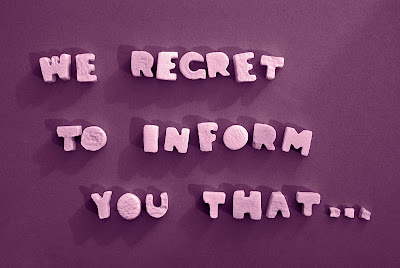Feedback Thoughts: Accepting Rejection and Negative Feedback
The two articles I read for this post are Why It's So Hard to Hear Negative Feedback by Tim Herrera and Why rejection hurts so much--and what to do about it by Guy Winch. Personally, I struggle with dealing with rejection and sometimes with negative feedback, although I have gotten much better at dealing with criticism since starting university. One of the main ways that I have improved my writing is through criticism written on my papers by professors, which I find incredibly helpful. The least helpful criticisms I have ever received typically involve people telling me that they do not like the way I did something but not telling my how to improve in the future. Simply criticizing someone without offering help or guidance is not really all that helpful.
I still tend to take things personally, even though I know that I shouldn't as most people mean well when they are offering criticism. Rejection, too, shouldn't be taken personally but rather as a fact of life and an opportunity for learning. I enjoyed reading Winch's article and seeing his suggestions for dealing with rejection (mainly keeping in mind that it is not personal and avoiding harsh self-criticism). Many people have a difficult time dealing with rejection, which the article points out is due to the evolutionary need to be accepted into a group, and it is important to use rejection to improve how one goes about something, whether it be a job interview, an application for school or for a scholarship, or a relationship. Sometimes, things simply do not work out, such as when someone is not interested in having a relationship with you or you just aren't a good fit for a job. Other times, there are things we can do to improve our performance and avoid rejection in the future.
In regard to Herrera's article, I find it interesting that he advises practicing good reactions to negative feedback and not giving in to temptation to sulk over things so as to train oneself to react better to criticism automatically. Few people like criticism, which the article states actually results in emotional pain in those receiving it, but everyone can benefit from constructive comments and I think it is important to train yourself to react well to such comments and to learn from them, though they may not necessarily be right. I know that I struggle with taking negative feedback personally, yet there have been plenty of times where I have had to give negative feedback and did so with no hard feelings towards whoever I was critiquing. I need to remember that most other people do not give criticism out of malice but as a way to help you perform better, whether it be related to work, school, or relationships.
That said, I also recognize that many people, including myself, need to work on how they give feedback so as to not be too aggressive or insensitive and to avoid conflict and pain as much as possible. At my current job, my supervisor is very helpful when she gives me feedback on my job performance. She outlines what all I am doing well and what I need to work on, offering helpful advice and guidance on how to improve. Well-constructed negative feedback can be extremely helpful in all aspects of life as no one is perfect and we all need others to help us become our best selves. Overall, I found these readings helpful as they involve things I struggle with and offer helpful methods for overcoming these challenges that everyone faces at one point or another.
I still tend to take things personally, even though I know that I shouldn't as most people mean well when they are offering criticism. Rejection, too, shouldn't be taken personally but rather as a fact of life and an opportunity for learning. I enjoyed reading Winch's article and seeing his suggestions for dealing with rejection (mainly keeping in mind that it is not personal and avoiding harsh self-criticism). Many people have a difficult time dealing with rejection, which the article points out is due to the evolutionary need to be accepted into a group, and it is important to use rejection to improve how one goes about something, whether it be a job interview, an application for school or for a scholarship, or a relationship. Sometimes, things simply do not work out, such as when someone is not interested in having a relationship with you or you just aren't a good fit for a job. Other times, there are things we can do to improve our performance and avoid rejection in the future.
In regard to Herrera's article, I find it interesting that he advises practicing good reactions to negative feedback and not giving in to temptation to sulk over things so as to train oneself to react better to criticism automatically. Few people like criticism, which the article states actually results in emotional pain in those receiving it, but everyone can benefit from constructive comments and I think it is important to train yourself to react well to such comments and to learn from them, though they may not necessarily be right. I know that I struggle with taking negative feedback personally, yet there have been plenty of times where I have had to give negative feedback and did so with no hard feelings towards whoever I was critiquing. I need to remember that most other people do not give criticism out of malice but as a way to help you perform better, whether it be related to work, school, or relationships.
That said, I also recognize that many people, including myself, need to work on how they give feedback so as to not be too aggressive or insensitive and to avoid conflict and pain as much as possible. At my current job, my supervisor is very helpful when she gives me feedback on my job performance. She outlines what all I am doing well and what I need to work on, offering helpful advice and guidance on how to improve. Well-constructed negative feedback can be extremely helpful in all aspects of life as no one is perfect and we all need others to help us become our best selves. Overall, I found these readings helpful as they involve things I struggle with and offer helpful methods for overcoming these challenges that everyone faces at one point or another.
Photo by Caro Wallis. Source: Flickr




Comments
Post a Comment